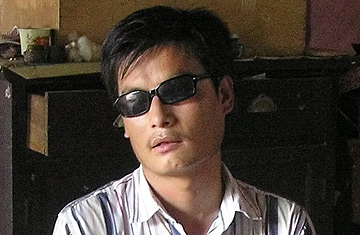
Chinese dissident Chen Guangcheng
A balmy Sunday recently found Yuan Weijing and her two-year-old daughter in the apartment he has hardly left since arriving in Beijing on July 6. Yuan, 30, a forthright homemaker from the coastal province of Shandong, won't venture out for fear of being kidnapped. As paranoid as that might sound, in Yuan's case it is a well-founded concern. Her husband, Chen Guangcheng, a lawyer and activist, was himself kidnapped by policemen from his native Shandong province when he visited Beijing in June of 2005. Chen, who has been blind since birth, is now serving a four-year prison term in Shandong, having incurred the wrath of local authorities by publicizing the plight of women forced to undergo abortions and sterilizations.
Chen was nabbed immediately after talking with another TIME reporter, but this didn't seem to bother his wife, though she did tell us we might run into trouble from the three carloads of policemen she had seen hanging around the apartment complex. Yuan's hosts, activist Hu Jia and his wife Zeng Jingyan (named earlier this year as one of TIME's 100 most influential people for her efforts via the Internet to secure his freedom after he was arrested last year), also warned us that some diplomats who had visited earlier were prevented from entering. We were pretty confident we would be let in, though. Under new regulations issued ahead of the 2008 Beijing Olympics, most restrictions on reporting in China by foreign journalists were lifted. We can now interview anyone so long as they give their consent, which Yuan certainly had done. The rules have been in effect for seven months now, and the police are well briefed on them, at least in Beijing.
In fact, the only visible guard was a plump, genial-looking individual in a striped polo shirt and shiny brown patent leather shoes. He asked politely for our accreditation. As he was laboriously recording the details, he glanced up and asked when our appointment was, grinning sheepishly when I observed that he likely was already well aware that we were half an hour late.
In Hu Jia's fourth-floor walk-up apartment, we were introduced to Yuan, who was wearing a T-shirt emblazoned with a picture of her husband. She explained that she was afraid that he might be beaten again in prison or receive some other punishment. The authorities were angry with him because of his refusal to acknowledge he was a criminal. Chen was convicted of damaging property and organizing a mob to disturb traffic, charges he denies. The court that sentenced him is controlled by the same Communist Party officials whom he had embarrassed with his revelations about their overzealous enforcement of the one-child policy.
Yuan described how he had refused to allow his head to be clean-shaven, the mid-June incident that precipitated the beating. She explains: "He didn't mind having it cut short but a totally shaved head is a sign of a criminal. 'I am not a criminal, I am a Chinese worker,' he told them." She said that some six or seven other convicts then jumped him and beat him. He was pushed to the ground, his hands manacled behind his back, and held down while his head was shaved. When Yuan made her monthly visit on June 19, he still had bruises all over his body and couldn't walk upright because of blows he had received to his side, she said. "There are other people in jail who deserve attention, but Chen's case is very unusual because he is blind, and it is so clear he was imprisoned unjustly," Yuan said.
Conventional wisdom had held that as the Olympics drew closer, conditions would ease for dissidents as Beijing tried to show its best face to the world. But with a year to go before the Games, China's Communist leaders have shown no intention of easing up. "It's a policy of 'soft to the outside, strict within,'" Hu Jia told TIME. He warned, too, that once the Olympics were over, things would really get bad for activists. "I have already been warned by a policeman. He said, 'You are very lively right now aren't you? Just wait. There'll be a settling of accounts after the Games are over.' "
Outside, the summer afternoon waned. Cicadas whirred. We drank tea and talked. Yuan's daughter came out to play. Some workers arrived to install an extra bed. Then we left with all the usual polite exchanges. Understandably, Yuan didn't step over the lintel to see us out, as usually happens in China. On our way to the front gate, we passed the policeman, who had found himself a folding chair and was slumped in it, Buddha belly bulging. He waved to us and called out a cheery, "Bye bye."
